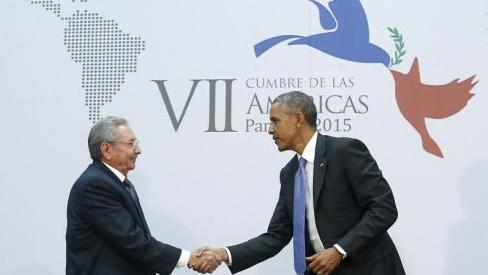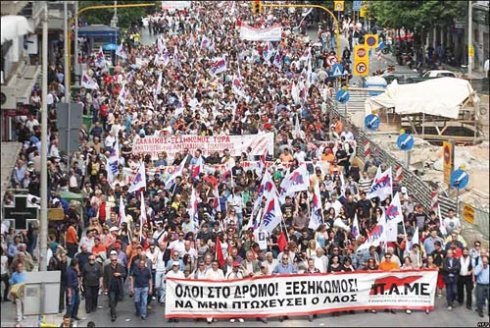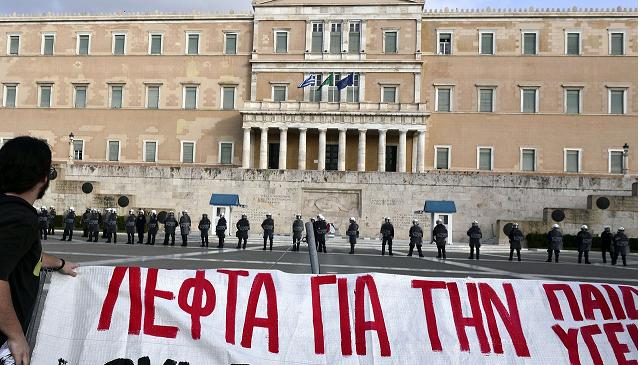Greece: The EU, the bankers and the Greek government approve more austerity measures
The capitalists must pay for the crisis
03/07/2011
The political crisis in Greece and the growing workers’ and popular resistance and mobilization more sharply express the contradictions that Europe is going through
In Greece, popular resistance to the government’s economic program and the bailout agreement with the European Union (EU), the European Central Bank and the IMF are at center stage. The demonstrations that managed to bring together more than half a million people in almost 50 cities of the country showed that. Since the announcement of the first austerity plan in May, 2010, the trade union federations GSEE (of the public sector) and ADEDY (private sector) have called fourteen 24-hour general strikes, most of them with mobilization in the streets, but since their leaderships are controlled by PASOK (the governing party), they limit the strikes to mere actions to exert pressure. However, resistance and rejection of the government and the political class, that made a leap with the emergence of the movement of the "aganaktismenoi" ("the outraged ones") in Constitution Square with their massive march on June 5, put the government on the verge of a crisis.
The vote of confidence in PASOK does not resolve the crisis
PASOK has just gone through a week of profound crisis, that included the internal "rebellion" of 16 deputies who defected in disagreement with the new cuts and taxes and Prime Minister George Papandeou’s unsuccessful appeal to form an alliance with the opposition party, the right-wing New Democracy. After this failure and under pressure, on the one hand, from hundreds of thousands of workers, retirees and the unemployed in the streets, and, on the other hand, from the toughening up of the EU finance ministers and the international lending agencies that refused to make a new loan, PASOK chose to present a cabinet change, by naming as Finance Minister, Evangelos Venizelos, a novice in economics, known as a skilled "political operator," who became famous for solving the party’s problems behind the scenes. The government’s new cabinet won a vote of confidence in Parliament, although with a very narrow margin (155 in favor and 143 against), on June 22, with which it will try to pass a new package of measures next Tuesday. This vote of confidence is one of the IMF and EU conditions for releasing the final installment of the 12 billion euro bailout for Greece.
However, the political crisis the Greek regime is going through, will not be resolved with this vote of confidence, since the very substitution that PASOK represented less than 2 years ago, now appears [too] weakened and worn to pass the austerity measures in view of the harsh conditions from the EU, on the one hand, and the workers’ and popular resistance, on the other. This halfhearted substitute measure is far from being viewed as a solution for the problems of the workers and the masses, since it will only intensify interference by the international creditors, that are demanding a 28 billion euro budget reduction, and the collection of 50 billion euros in new taxes, and a plan to privatize water, energy, and telecommunication firms, ports, airports and other public properties. On the other hand, under the new austerity plan, by 2015, the debt will amount to 200% of GDP.
The specter of default
Under these terrible conditions of austerity, there is still no guarantee that the country will avoid default, a prospect that if it arises, would represent enormous losses for German banks and French holders of the Greek debt, that are the most exposed to crisis. Faithful to the interests of capital, the government is frightening with the specter of "default" and its subsequent exit from the Euro zone, at the same time that it is telling the Greek workers and masses that they "have to make sacrifices" to again "win the confidence of the international markets." PASOK, in a desperate attempt, is trying to reestablish real confidence by saying that the austerity measures "are against its will," but the truth is that these attacks are demands from the big employers and from the banks, the main supporters of PASOK, that want to make the workers, young people and the unemployed, pay for the crisis. The austerity alternative would entail an unprecedented degree of interference from the international organizations in a country of the EU. The "tripartite supervision" by the European Commission, the European Central Bank and the IMF, would give a green light to direct intervention against Greece (in accordance with the EU treaties, when a member state is subjected to "supervision," the Finance Ministers of the other countries can make decisions about the economic policy of said country without its consent). This is only a pure and simple direct economic intervention against a sovereign state.
The leaderships of the workers’ movement
Up to now, the massive movement in the streets has not managed to acquire a dynamic that could formulate a workers’ alternative and a solution to the crisis. According to some surveys, 47% of the population participated in at least one mobilization, and 75% support the resistance movement. This figure contrasts with the completely wretched politics of the union leaderships of the GSEE and ADEDY, that only call isolated strikes, without continuity, acting as a means of pressure to negotiate a less severe austerity plan. Their role is that of being government supporters, to save it, so that it will continue acting as a loyal representative of big capital. The movement of the "aganaktismenoi" ("the outraged ones") exposes the inability of these leaderships to raise a unifying policy that will bring together the demands against unemployment, increased taxes and attacks on pensions.
For its part, the Communist Party of Greece (KKE), that controls the PAME union front, which has union groups from the public and private sectors, has a completely self-proclaimed policy of building its own union front, refusing to talk to or have any policy towards the rest of the organizations of the workers’ movement. On the other hand, it accuses the GSEE and ADEDY federations of being agents of capital, without distinguishing between the leaderships of these unions and the rank and file workers, and it has a completely sectarian line towards the movement of the outraged ones. At the same time, after the June 15 strike, the KKE merely proposes as an alternative, a general strike as a solution, in order to deal a "blow to the government," as stated in its emergency declaration: "We demand elections so that the people can bring about the first profound injury in the bourgeois political system. The weaker the government that is formed is, the easier it will be for the people to avoid something worse."
To the left of PASOK is Synaspismos, that originally came from the Coalition of the Left and Progressive Forces, formed in 1989. This coalition has a deputy in the Greek Parliament, and at the European level it is part of the European United Left, an alliance with, among others, the Spanish IU, the Bloque de Esquerda of Portugal, Refundazione Comunista of Italy, and the French CP, acting jointly in the Green-Red bloc of the European Parliament, whose slogan is "Another world is possible. Another Europe is possible." Syriza is active within Synaspismos, and, faced with austerity, they propose a restructuring and renegotiation of the Greek public debt, while they pin their hopes on a presence in the elections and on the seats of their own allies in the coalition of the European left, without offering any participation to the working class.
In view of the worsening of the political crisis, the groups of the left are calling for a united front of the left with the Communist Party of Greece (KKE), Syriza and Antarsya (Anti-capitalist Left Front of Greece), that extends from participation in common struggles and could go as far as carrying out a common intervention in the next elections. They propose the participation of the working class, but in order to take its energies to the terrain of elections.
Another 48-hour general strike has been called for June 27 and 28 (June 28 is the day that the new measures would be approved). These days are an opportunity to begin to prepare a solution that will go beyond the bureaucracy’s strategy of weakening, that will prepare the general strike and the unification of the working class with the young people who face uncertain conditions, the unemployed and retirees who are participating in the movement in the squares. In connection with this, the working class must incorporate the demands of young people in precarious situations, the unemployed, immigrants and the rest of the groups, so that, as a part of the struggle for a political solution independent of the bourgeoisie and capital, they avoid having their demands exploited by bourgeois alternatives.
Every solution within the structures of capital – whether devaluations or austerity – will entail more misery and sacrifices for the workers and the urban masses and will represent a greater degree of semi-colonial dependence for Greece. In 13 months, the workers have led 14 general strikes, that have not served to restrain PASOK’s austerity plan. The leaderships of the workers’ movement have engaged in keeping the workers divided with powerless actions. It is obvious that the solution will not come from these leaders; it is necessary to forge an alternative of class independence that will propose the political general strike as a measure to overthrow this government and that proposes nonpayment of the debt, nationalizing banking and the big enterprises, under workers’ control and without compensation, an emergency economic plan that will solve the most urgent problems of the workers and the impoverished masses, that, among other measures, proposes eliminating the value-added tax, distributing the hours of work without reducing wages, and wages equivalent to the family basket.
Angela Merkel’s German government, that leads the Euro zone, is seeking to divide the working class, by trying to win over German wage earners with a chauvinist policy against the Greek workers, accusing them of being "slackers," who must not be subsidized at the expense of sacrifice by German workers. It is necessary to oppose this division from the Europe of capital, with the solidarity of one Europe of and for the workers and the masses, with a perspective that will unify the demands throughout the continent, without divisions between rich and poor countries, that are used to unload the weight of the crisis on them. The fight for a class alternative in Greece and for a workers’ solution to the crisis must be closely linked with the prospect of a Federation of Socialist States of Europe.
Is devaluation a favorable choice for the masses?
The EU’s action as an administrative "committee" that is carrying out the interests of capital has led some groups, even prominent people of the left, to support a pro-default, but "orderly" solution, and there are even groups that propose opting out of the euro, facing the rulings from the international organizations. The profound Greek political and economic crisis deeply questions European monetary policy and the common currency. Faced with this and popular resistance against austerity and the terrible conditions of a new bailout package, some groups, relying on the argument that default is inevitable, suggest that it is better that it happen in an "orderly" fashion, accompanied by measures like the nationalization of banking, strong government control and control of the foreign market. The proposal in favor of default and returning to the old currency (the drachma), as a way of not submitting to the rulings of capital is, in reality, a false illusion. The argument that countries like Argentina recovered after default and managed to get out of the crisis, is also used. However, this solution leaves aside the immense social cost of default, as shown by the loss of 40% of the wages of the workers through devaluation. The case of Argentina was also favored by exceptional growth internationally, that included an increase in raw materials, new priorities for the economy, and brutal growth of uncertain employment (40% of jobs in Argentina are now in the informal sector). That is, both austerity plans in the context of the euro and the default and subsequent devaluation, are solution from the bosses and their governments, in order to unload the crisis on the backs of the working class and the Greek people.
June 23, 2011
Traducted by Craig Abernethy




















